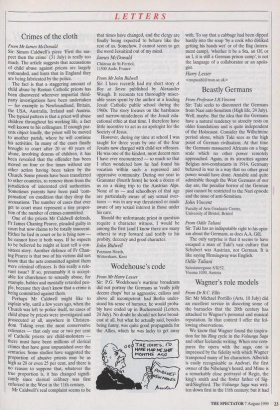LETTERS Crimes of the cloth
From Mr James McDonald Sir: Simon Caldwell's piece 'First the sus- pect then the crime' (31 July) is really too much. The article suggests that accusations of child abuse against priests are largely unfounded, and hints that in England they are being fabricated by the police.
The fact is that a staggering amount of child abuse by Roman Catholic priests has been discovered wherever impartial third- party investigations have been undertaken — for example in Newfoundland, Britain, the USA, Australia, Ireland and Austria. The typical pattern is that a priest will abuse children throughout his working life, a fact well known to his colleagues. If enough par- ents object loudly, the priest will be moved to another parish, where he will continue his activities. In many of the cases finally brought to court after 20 or 40 years of abuse, involving dozens of children, it has been revealed that the offender has been moved on four or five times without any other action having been taken by the Church. Some priests have been transferred to other countries, to remove them from the jurisdiction of interested civil authorities. Sometimes parents have been paid 'com- pensation' on condition that they drop the accusations. The number of cases that ever get to court must represent a tiny propor- tion of the number of crimes committed.
One of the priests Mr Caldwell defends, Fr James Chaning Pearce, pleaded guilty in court but now claims to be totally innocent. Either he lied in court or he is lying now — he cannot have it both ways. If he expects to be believed he might at least tell a con- sistent story. Another defence of Fr Chan- Ing Pearce is that two of his victims did not know that the acts committed against them were criminal offences. Is this really a rele- vant issue? If so, presumably it is accept- able for churchmen to sexually abuse, for example, babies and mentally retarded peo- ple, because they don't know that a crime is being committed against them.
Perhaps Mr Caldwell might like to explain why, until a few years ago, when the Church was left to police itself, no cases of child abuse by priests were investigated and prosecuted at all, anywhere in Christen- dom. Taking even the most conservative estimates — that only one or two per cent of Catholic priests are child-molesters — there must have been millions of clerical crimes that have gone unpunished over the centuries. Some studies have suggested the proportion of abusive priests may be as high as 20 or even 25 per cent, and there is no reason to suppose that, whatever the true proportion is, it has changed signifi- cantly since clerical celibacy was first enforced in the West in the 11th century.
Mr Caldwell's real complaint seems to be that times have changed, and the clergy are finally being expected to behave like the rest of us. Somehow, I cannot seem to get the word Jesuitical out of my mind.
James McDonald
Château de St-Ferriol, 11500 Aude, France


























































 Previous page
Previous page